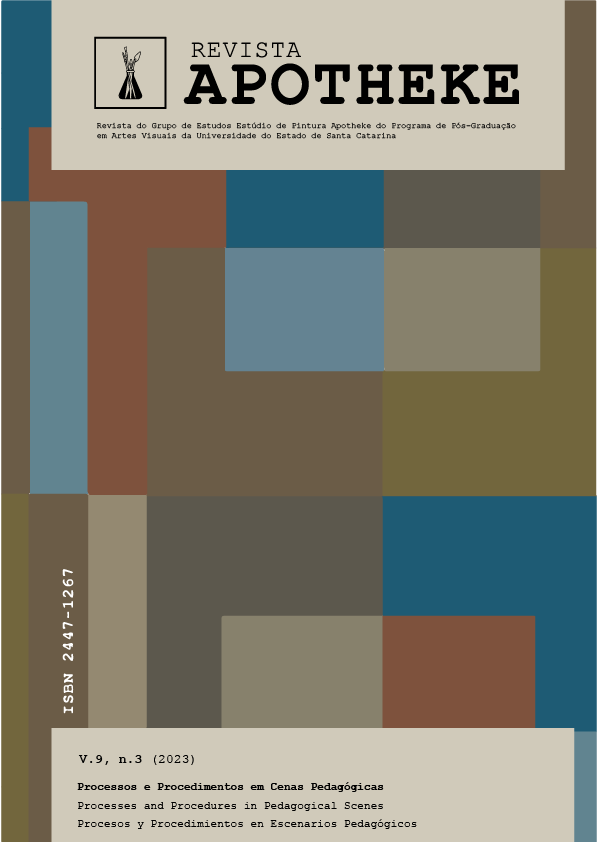John Dewey and Henri Matisse: between aesthetic theory and artistic practice
DOI:
https://doi.org/10.5965/24471267932023297Keywords:
Dewey, Matisse, modern art, pragmatist aesthetics, artistic expresssionAbstract
The aesthetic theory developed by John Dewey and presented in his 1934 book, “Art as Experience”, is considerably influenced by modern art and artists. This influence, however, has so far received little attention from interpreters. The aim of this article is precisely to shed light on these relationships by presenting the relationship between the philosopher and the French painter Henri Matisse. The hypothesis is that these encounters between artist and thinker had an impact on Dewey’s philosophy of art. The argument is divided into four parts. In the first, the context in which the meetings took place was discussed, namely the Barnes Foundation. This was followed by a review of the historical letters from these meetings. Thirdly, we sought to understand the theoretical impact of this exchange on Dewey’s aesthetics.Finally, brief concluding remarks were presented.
Downloads
References
AICHELE, Kathryn Porter. Albert C. Barnes, Chaim Soutine, and the Art in Seeing. In: AICHELE, Kathryn Porter. Modern Art on Display. The Legacies of Six Collectors. Neward: University of Delaware Press, 2016, p. 37-69.
ALEXANDER, Thomas. John Dewey’s Theory of Art Experience & Nature: The Horizons of Feeling. Albany: SUNY Press, 1987.
ANDERSON, John. Art Held Hostage. The Battle over the Barnes Collection. New York and London: W. W. Norton & Company, 2013.
ARENAS, L., DEL CASTILLO, R. y FAERNA, Á. M. (eds.). John Dewey. Una estética de este mundo. Zaragoza: Prensas de la Universidad de Zaragoza, 2018.
BARNES, Albert Coombs. The Roots of Art. In: BARNES, Albert Coombs; DEWEY, John et al.Art and Education. Merion: Barnes Foundation Press, 1929, p. 16-20.
CAMPEOTTO, Fabio; VIALE, Claudio Marcelo. Barnes’ influence on John Dewey’s Aesthetics: a preliminary approach. Cognitio, São Paulo, v. 19, n. 2, p. 227-241, 2018.
CAMPEOTTO, Fábio; VIALE, Claudio Marcelo. Giro estético y vanguardia: Acerca de la influencia del pragmatismo de John Dewey en artistas norteamericanos. Pensando - Revista de Filosofia, v. 10, n. 10, p .58-78, 2019. [Disponível em: <https://revistas.ufpi.br/index.php/pensando/article/view/8678/5694>. Acesso em: 26 de ago. de 2023].
CAMPEOTTO, Fábio. La estética de John Dewey y la historia del arte: Teoría y praxis. [Tesis para alcanzar el título de Doctor en Filosofía] – Facultad de Filosofía y Humanidades, Universidad Nacional de Córdoba, Córdoba, 2021, p.440.
DALTON, Thomas C. Becoming John Dewey: Dilemmas of a Philosopher and Naturalist. Bloomington: Indiana University Press, 2002.
DENNIS, Lawrence. Dewey’s Debt to Albert Coombs Barnes. Education Theory, v. 22, n. 3, p. 325-333, 1972.
Downloads
Published
How to Cite
Issue
Section
License
Copyright (c) 2024 Laura Elizia Haubert

This work is licensed under a Creative Commons Attribution-NonCommercial 4.0 International License.
Copyright and Licensing Policy
Authors of works submitted to Revista APOTHEKE authorize their publication in both print and digital formats exclusively for academic purposes. Reproduction is permitted, provided that the source is properly cited. Authors confirm the originality, authorship, and unpublished status of their manuscripts.
Articles published by the journal are freely available and intended for academic and non-commercial use only. All copyrights are transferred to the journal. The content of signed articles reflects the views of their respective authors and not the official position of Revista Apotheke. The author(s) agree to always cite the following reference when republishing or referring to the content originally published in Revista Apotheke:
“This article was originally published by Revista Apotheke in volume (insert volume), number (insert number), year (insert year), and is available at: http://www.revistas.udesc.br/index.php/APOTHEKE/index”
It is the sole responsibility of the authors to obtain written permission for the use of any material protected by copyright law included in their articles. Revista Apotheke is not responsible for copyright infringements committed by contributors.
Authors retain copyright and grant the journal the right of first publication, with the work licensed under a Creative Commons Attribution-NonCommercial License (CC BY-NC):
-
Attribution (BY): Licensees are allowed to copy, distribute, display, perform, and create derivative works, provided that proper credit is given to the author or licensor, in the manner specified.
-
NonCommercial (NC): Licensees may use the material only for non-commercial purposes.
After publication, authors retain the rights to their work and may republish the text.



